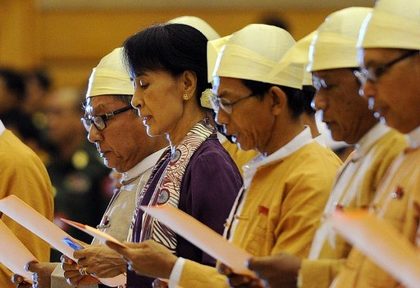SUMMARY
This is AI generated summarization, which may have errors. For context, always refer to the full article.

NAYPYIDAW, Myanmar (AFP) (UPDATED) – Myanmar pro-democracy leader Aung San Suu Kyi was sworn in as a member of parliament Wednesday, opening a new chapter in the Nobel laureate’s near quarter-century struggle against authoritarian rule.
The 66-year-old, in the capital Naypyidaw for the ceremony, stood to read the brief oath in unison with 33 other members of her National League for Democracy party elected to the lower house in April, an AFP reporter said.
The oath hands Suu Kyi public office for the first time and marks a transformation in the fortunes of the opposition leader, who was held under house arrest for much of the last 20 years but is now central to the nation’s tentative transition to democracy.
She had initially baulked at taking the oath, specifically a sentence pledging to “safeguard” the army-created constitution.
But on Monday she backed down after the head of the nominally civilian government President Thein Sein held firm over the oath, explaining it was the “desire of the people” to see her party in office after breakthrough April 1 by-elections.
Speaking to reporters after Wednesday’s ceremony the veteran dissident said: “I believe I can serve the interests of the people more than before”.
She was then whisked away by car to Naypyidaw airport to return to Yangon.
The international community greeted her election as a step towards democracy and had urged Suu Kyi, who drew huge crowds on the campaign trail, to take her seat amid fears her refusal could stall the transition from military rule.
UN chief Ban Ki-moon on Tuesday expressed hope of further cooperation between the NLD and Thein Sein’s government.
In comments later echoed by the US State Department, Ban said his meetings in Myanmar this week with Thein Sein and the NLD leader had left him “convinced that they will continue to make progress.”
The NLD is the main opposition force after securing 43 of the 44 seats it contested in the by-elections.
The party, which boycotted a controversial 2010 election, agreed to rejoin the political mainstream last year after a series of reforms by the government.
But it is still a minority influence in parliament with one quarter of the seats in both chambers reserved for unelected military officials.
Renaud Egreteau, a Myanmar expert from the University of Hong Kong, said Suu Kyi’s retreat over the oath showed that compromise was now among her “political tools”.
“Aung San Suu Kyi and the League (NLD) should not push themselves into paradoxes by agreeing to participate in the army’s constitutional game while refusing the rules,” he added.
Appearing alongside Ban after talks at her lakeside villa in Yangon on Tuesday, Suu Kyi said she was willing to compromise for the sake of reform.
“We have always believed in flexibility, in the political process… that is the only way in which we can achieve our goal without violence,” she said.
The democracy icon, who was released from house arrest in 2010, has shown increased confidence in Thein Sein’s government in recent weeks, calling for the suspension of EU sanctions and planning her first international trip in 24 years.
Last week, European Union nations suspended most sanctions against the resource-rich but poor nation for one year to reward the reforms, which included releasing some political prisoners.
But the United States has ruled out an immediate end to its main sanctions.
Suu Kyi’s long journey from political prisoner to politician has come at great personal cost.
The daughter of Myanmar’s independence hero General Aung San, Suu Kyi studied at Oxford University and had two sons after marrying British academic Michael Aris.
A charismatic orator, she took a lead role in the pro-democracy movement after returning to Yangon in 1988 and was first placed under house arrest by army generals the following year.
She remained a figurehead for the NLD which swept 1990 polls but was never allowed to take power.
Her husband died in 1999, and in the final stages of his battle with cancer the junta denied him a visa to see his wife.
Suu Kyi refused to leave Myanmar to visit him, certain she would never have been allowed to return. – Shwe Yinn Mar Oo, Agence France-Presse
Add a comment
How does this make you feel?
There are no comments yet. Add your comment to start the conversation.